11 Bedtime Routines to Get Your Best Sleep Ever

You know how important it is for your energy levels and mood to get a restful night of sleep. It’s an essential for your overall health—experts at Harvard’s Division of Medicine prioritize sufficient sleep right up there with a healthy diet and regular exercise.
However, Americans are nowhere near getting the right amount of quality Z’s. In fact, about one-third of U.S. adults don’t get enough sleep, according to recent statistics, which can lead to a variety of health issues including anxiety, depression, an increased risk of obesity, diabetes, heart disease, and more. Luckily, revamping your bedtime routine in the pursuit of better sleep has become a popular trend on TikTok and within the wellness world. Seventy-six of adults who follow a bedtime routine report higher sleep quality, so isn’t it time you thought about yours? Here are 11 ways to set yourself up every night to have the best sleep ever.
RELATED: Doctor Reveals 3 Easy Ways to Get a Better Night’s Sleep
1
Set an alarm for your bedtime routine to begin.

Just like you set an alarm to wake up in the morning, set one for when your bedtime routine should start. This way, you can “firmly establish a consistent sleep cycle,” according to Nathan Baumann, PhD, a Denver-based clinical psychologist who specializes in sleep.
Ideally, you should select a sleep time that aligns with when you naturally begin to feel tired—aiming to get a total of seven to nine hours of sleep every night.
2
Take a warm bath.
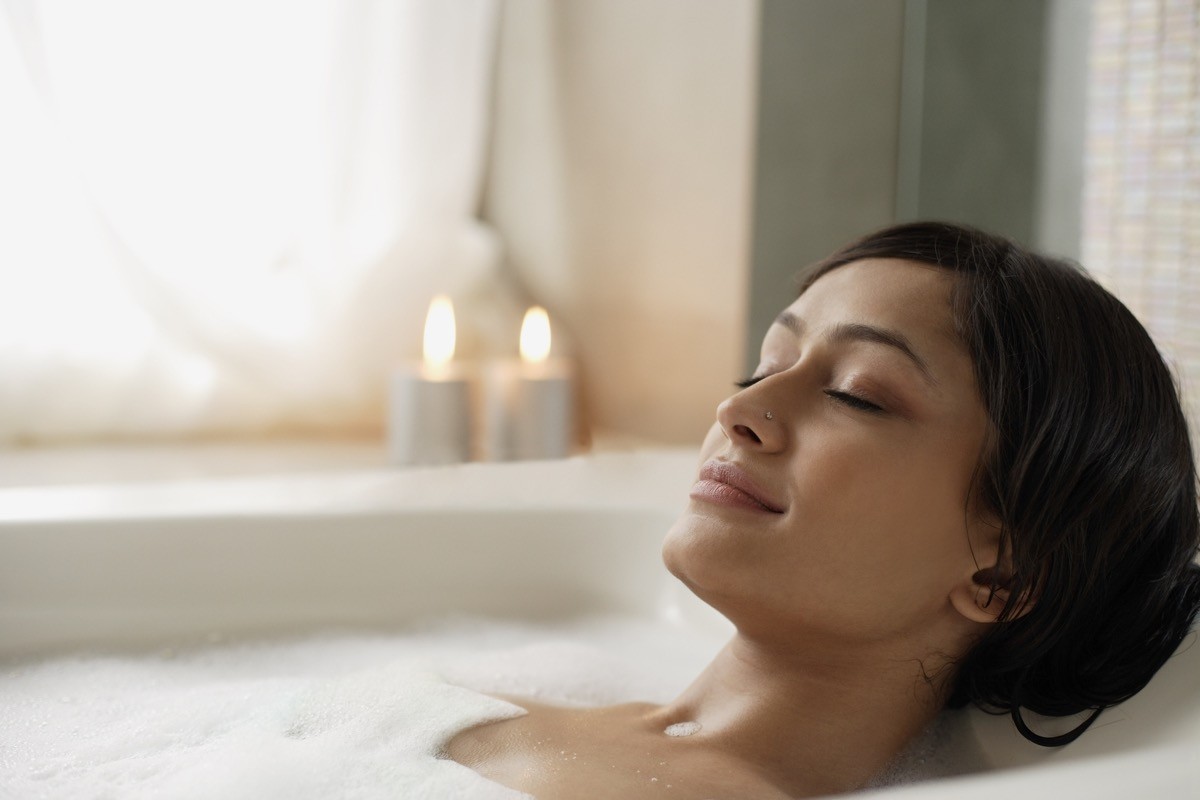
According to a 2019 meta-analysis published in Sleep Medicine Reviews, taking a warm bath or shower an hour or two before bedtime can help you sleep better.
Matthew Walker, PhD, a neuroscientist and sleep specialist at the University of California, Berkeley, explained during an interview on NPR’s Life Kit podcast why this works. Your core body temperature needs to fall by two to three degrees Fahrenheit to initiate good sleep, according to Walker, which happens by releasing heat through your hands and feet.
When you take a bath, you’re bringing your blood to the surface so that your hands and feet can act as radiators and release that heat, Walker said.
RELATED: If You’re Over 65, Don’t Wear These 5 Clothing Items to Bed
3
Lower your thermostat.
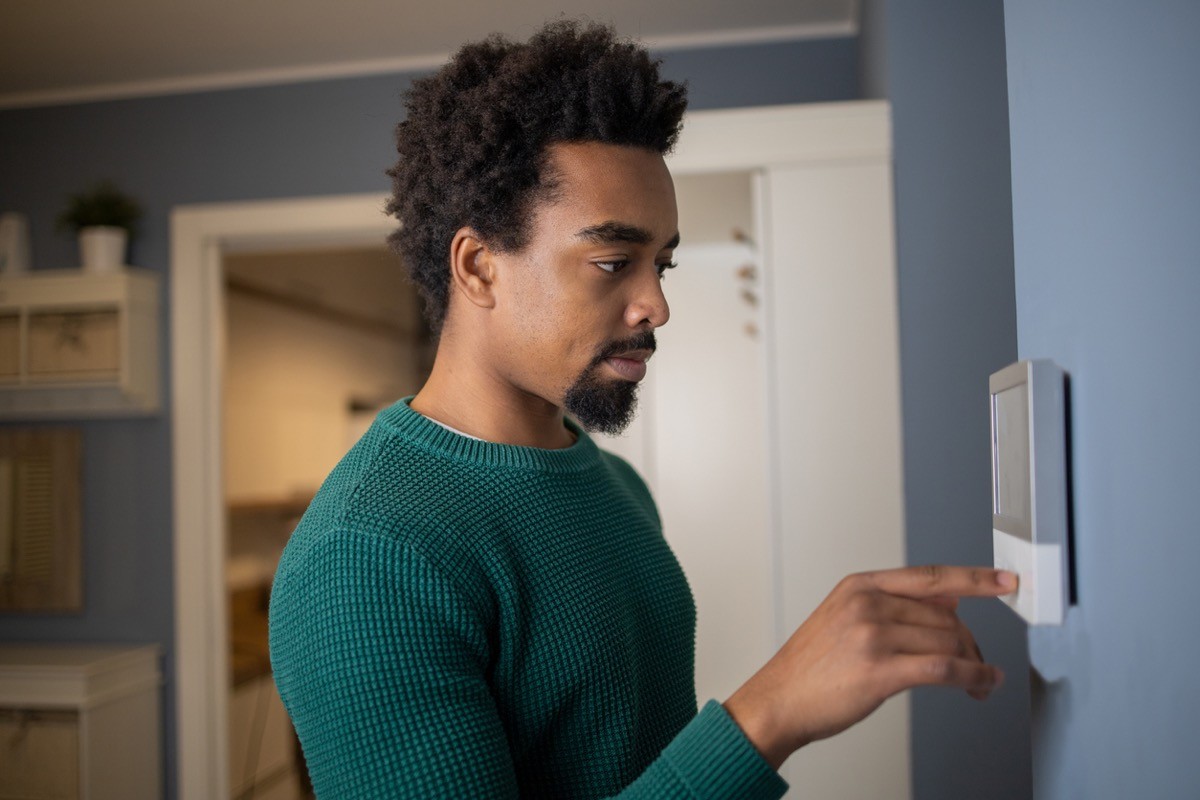
“The thermal environment is a key determinant of sleep because thermoregulation is strongly linked to the mechanism regulating sleep,” researchers explained in a 2012 study published in the Journal of Physiological Anthropology. “Excessively high or low ambient temperature may affect sleep even in healthy humans without insomnia.”
But what exactly is the ideal temperature for falling and staying asleep? The National Sleep Foundation (NSF) recommends keeping things on the cooler side at around 60 to 67 degrees Fahrenheit.
4
Prepare your bedroom.
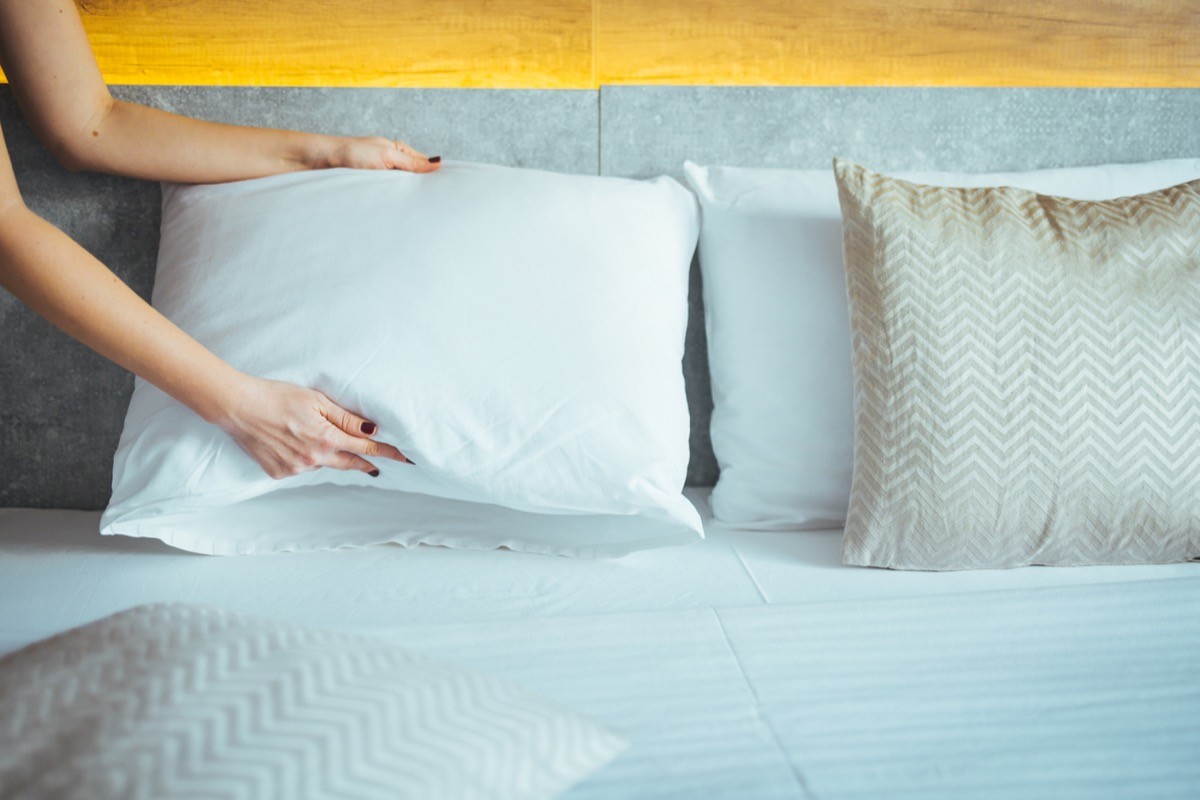
Set yourself up for a better night’s rest by decluttering your room and having a made bed already waiting for you.
“Clutter can stress you out. Move those dirty clothes to the closet, and make the bed every morning: research shows that people who do may sleep better at night,” experts from Johns Hopkins Medicine explain.
You should also consider “investing in high-quality sleep products to add to your bedtime routine,” Julia Forbes, certified sleep science coach at Sleep Advisor, advises.
“Focus on products such as a supportive mattress, comfortable pillows, and breathable bedding because they can significantly improve your sleep quality and make it easier to both fall asleep and stay asleep,” she says.
5
Drink a sleepy beverage.

There are many calming beverages, or “sleepy mocktails” as people on TikTok call them, that may help you fall asleep and stay asleep for longer. Tart cherry juice, warm milk, and non-caffeinated teas such as chamomile, ashwagandha, and valerian root tea are all believed to promote good sleep.
In fact, any non-alcoholic and non-caffeinated beverage that you drink nightly can help signal bedtime simply by becoming a consistent part of your routine.
“I would recommend avoiding caffeine for more than eight hours before going to bed,” adds Carlie Gasia, certified sleep science coach at Sleepopolis. “Caffeine can stay in your system for longer than you’d think and keep you awake at night.”
6
Put away your screens.
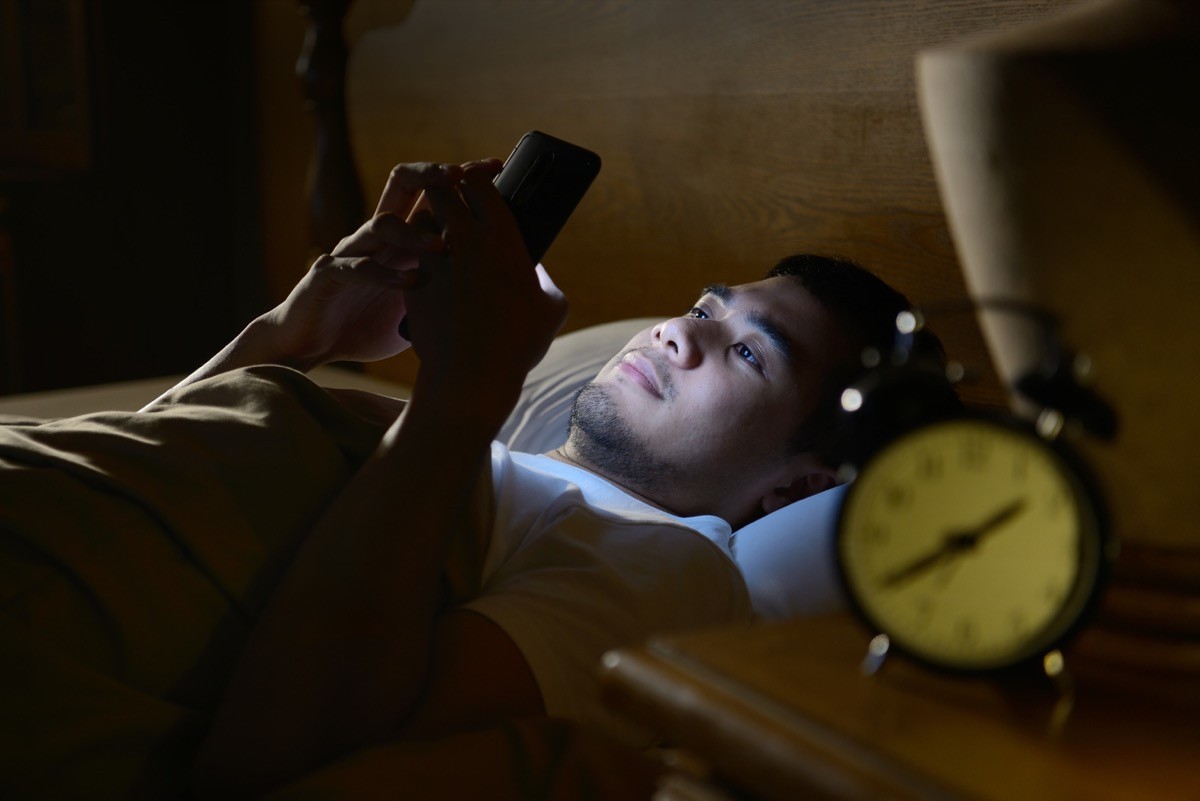
“Phones, tablets, and TVs emit blue light, which can mess with your circadian rhythm and tell the body that it is daytime—time to stay awake,” explains Candice Seti, PsyD, a licensed clinical psychologist who specializes in insomnia treatment.
To prevent this from messing with your sleep, Seti recommends setting a clear curfew for any screen time.
“It’s best to avoid all these things starting at least two hours before bedtime,” she recommends.
RELATED: 7 Foods That Will Help You Sleep
7
Engage in some light stretching.
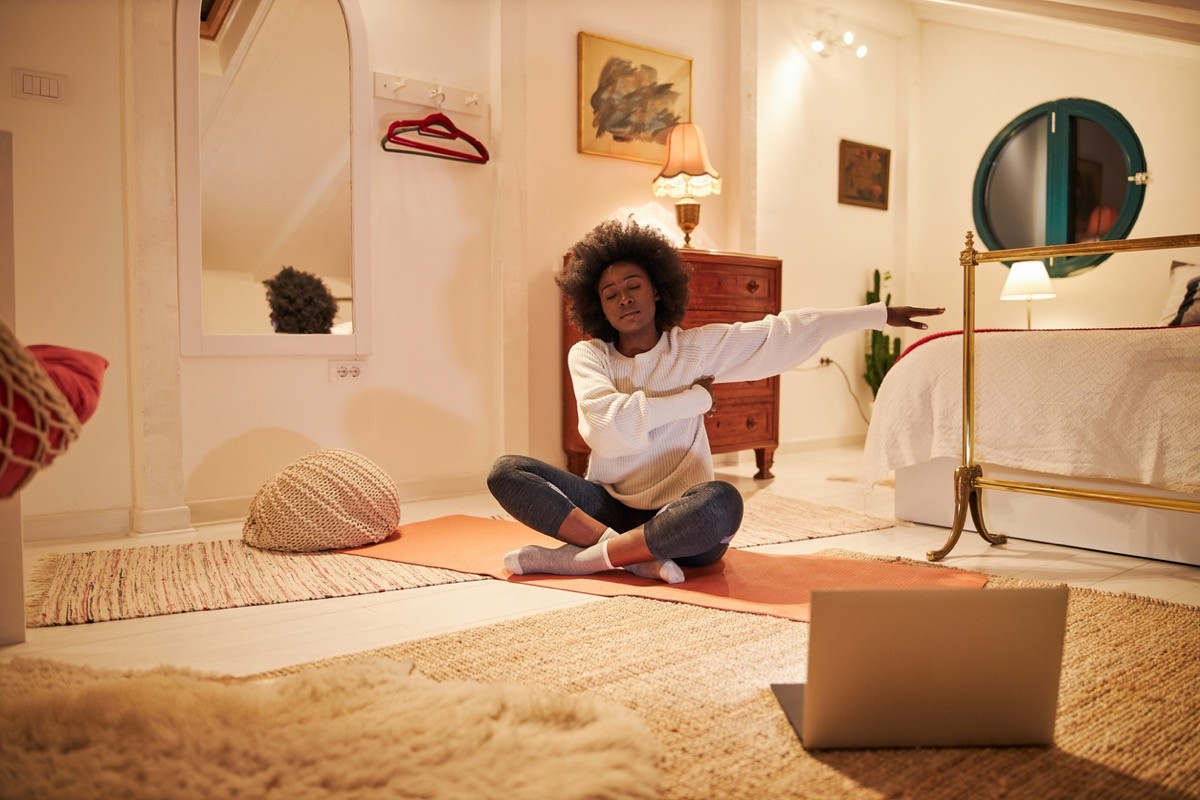
Mike Basten, DPT, CEO of Foothills Physical Therapy & Sports Medicine, is working to improve his patients’ health by adjusting their bedtime routine to include easy-to-perform stretches.
There are three stretches he recommends to help people “achieve restorative sleep.” This includes the 3-Way Prayer Stretch, which you start by sitting on your heels in a kneeling position, leaning forward, and then extending your arms in front of you on the floor.
“Move your hands to the right to stretch the left side of your back, hold, and switch to the left to stretch the right side. Finish by stretching directly forward to elongate the spine,” Basten says. “Do this three times in each direction, holding for 30 seconds each time.”
The other stretches he suggests are lower trunk rotations and diaphragmatic breathing—both of which can promote relaxation and help you “ease into a restful sleep,” he notes.
8
Rest your legs up on a wall.
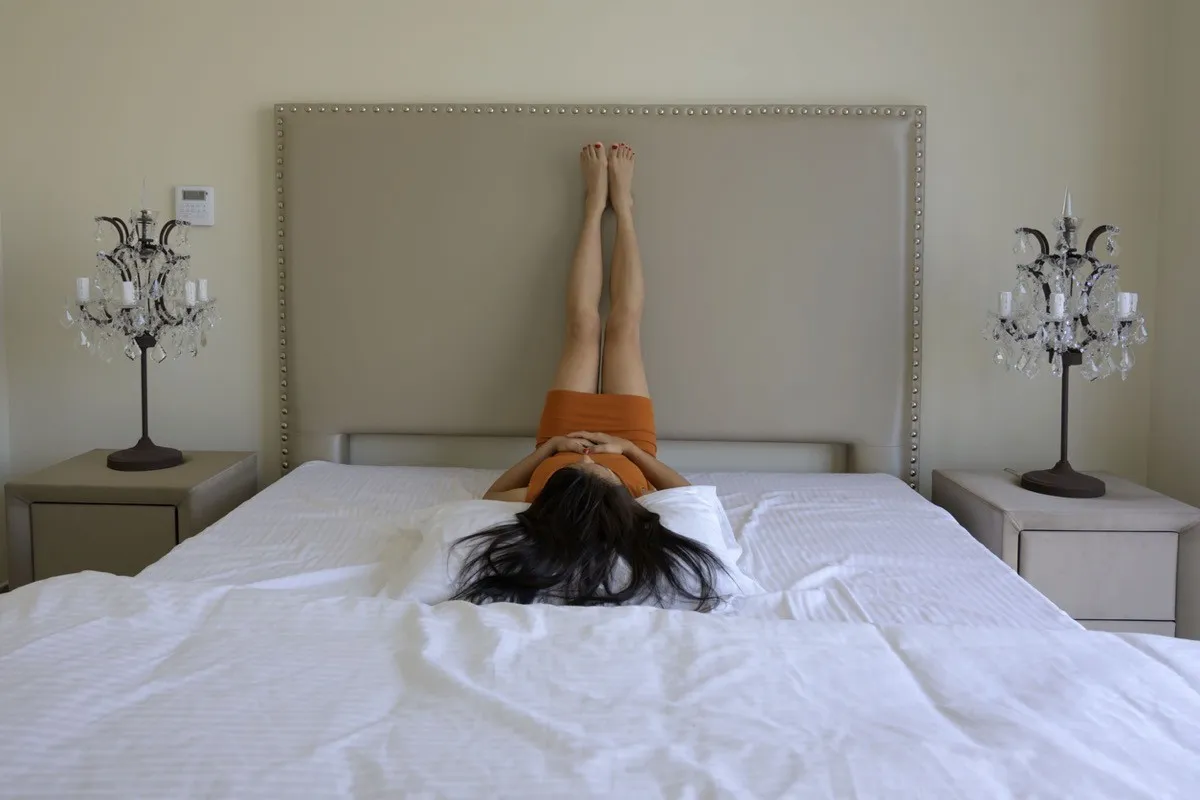
If you don’t think you’ll be able to commit to full-on stretches every night, Lauren Hays, psychiatric mental health nurse practitioner and co-founder of The Matrescence, has an even easier trick that might help you out. She suggests resting your legs up on the wall for eight to 12 minutes each night to “improve your sleep quality.”
How does this affect your sleep? For one thing, “it pulls you out of ‘fight or flight’ mode (sympathetic nervous system) and kicks your nervous system into parasympathetic or ‘rest and digest’,” Hays explains. It also “slows your heart rate and signals to body it’s safe and time to rest.”
9
Try mimicking “puppy energy” to wind down.

Like Hays, behavioral therapist Jennie Lannette Bedsworth, LCSW, has a more “unconventional method” she recommends as a bedtime routine. She refers to her approach as “puppy energy.”
Essentially, the idea is that you should try mimicking the behavior of a dog winding down for the night.
“Think about how a pup will circle their bed a few times, maybe potty one last time, then settle in with some deep exhales and body shakes before drifting off peacefully,” she says.
Translating this for humans, it might include you “doing some light movement like swaying gently side-to-side or shaking out the limbs, taking a final bathroom break, diffusing lavender or another calming scent, and then consciously releasing bodily tension through deep breaths,” according to Bedsworth.
“The animal instincts to prepare a cozy, safe rest space and shake off excess energy can be shockingly therapeutic,” she shares.
RELATED: This Guilty Pleasure Food May Improve Your Sleep
10
Tune into some calming music or white noise.

Listening to some soft, calming melodies can be just what you need to fall into a deep sleep. Consider turning on calming music or even white noise, which can include sounds of rain, ocean waves, or fans, Michael Kane, MD, board-certified physician and chief medical officer at the Indiana Center for Recovery, advises.
“This can drown out any external noises that may disrupt your sleep, and the repetitive sounds can be soothing and lull you into a more restful state.”
11
Meditate, journal, or read before closing your eyes.
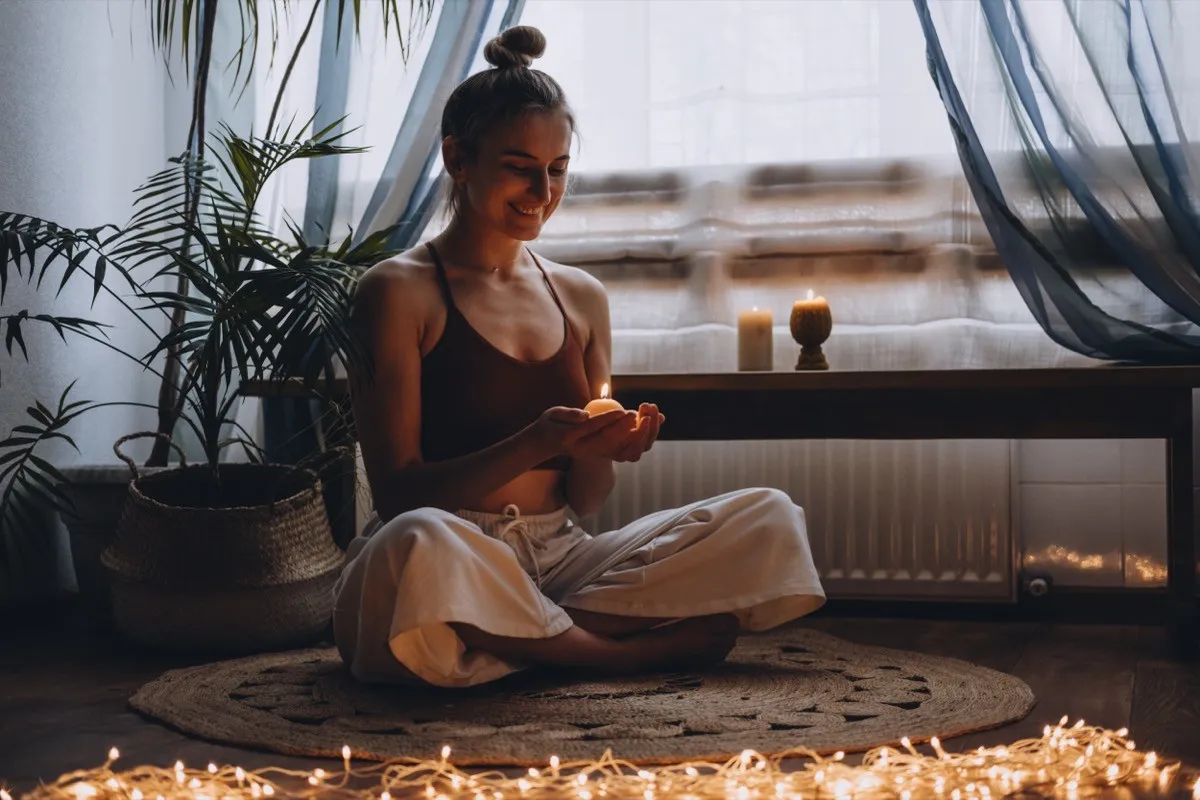
One of the most important bedtime routine rituals involves “picking one calming activity for those final moments awake,” Seti says.
This can be any tech-free activity that helps you relax in the last five to 10 minutes before you fall asleep—and by doing it every night, it can help you signal to your body that it’s almost time to fall asleep.
“Whether it’s meditation, light journaling, or gentle stretching while seated in bed, find a low-key activity to cap off the night and help your mind and body relax,” she advises.
- Source: Sleep Medicine Reviews: Before-bedtime passive body heating by warm shower or bath to improve sleep: A systematic review and meta-analysis
- Source: Journal of Physiological Anthropology: Effects of thermal environment on sleep and circadian rhythm
- Source: Johns Hopkins Medicine: Preparing Your Bedroom for a Great Night's Sleep